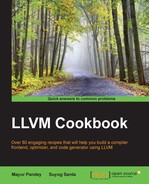Dragonegg is a gcc plugin that allows gcc to make use of the LLVM optimizer and code generator instead of gcc's own optimizer and code generator.
You need to have gcc 4.5 or above, with the target machine being x86-32/x86-64 and an ARM processor. Also, you need to download the dragonegg source code and build the dragonegg.so file.
Do the following steps:
- Create a simple
hello worldprogram:$ cat testprog.c #include<stdio.h> int main() { printf("hello world"); }
- Compile this program with your gcc; here we use gcc-4.5:
$ gcc testprog.c -S -O1 -o - .file " testprog.c" .section .rodata.str1.1,"aMS",@progbits,1 .LC0: .string "Hello world!" .text .globl main .type main, @function main: subq $8, %rsp movl $.LC0, %edi call puts movl $0, %eax addq $8, %rsp ret .size main, .-main
- Using the
-fplugin=path/dragonegg.soflag in the command line of gcc makes gcc use LLVM's optimizer and LLVM codegen:$ gcc testprog.c -S -O1 -o - -fplugin=./dragonegg.so .file " testprog.c" # Start of file scope inline assembly .ident "GCC: (GNU) 4.5.0 20090928 (experimental) LLVM: 82450:82981" # End of file scope inline assembly .text .align 16 .globl main .type main,@function main: subq $8, %rsp movl $.L.str, %edi call puts xorl %eax, %eax addq $8, %rsp ret .size main, .-main .type .L.str,@object .section .rodata.str1.1,"aMS",@progbits,1 .L.str: .asciz "Hello world!" .size .L.str, 13 .section .note.GNU-stack,"",@progbits
- To know about how to get the source code and installation procedure, refer to http://dragonegg.llvm.org/
..................Content has been hidden....................
You can't read the all page of ebook, please click here login for view all page.
